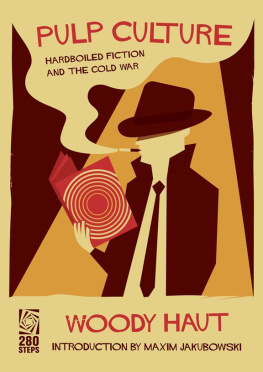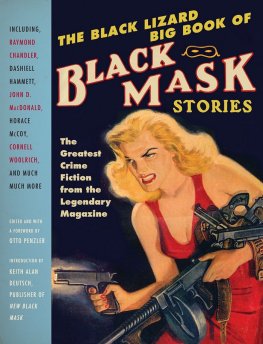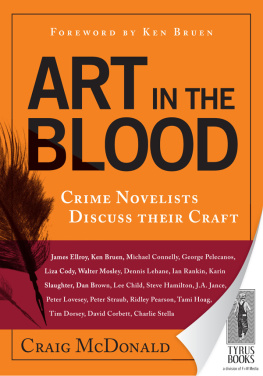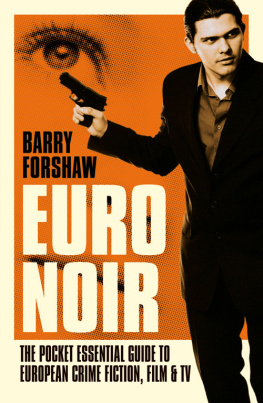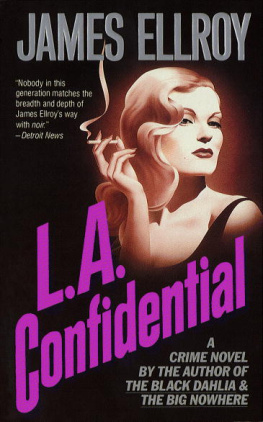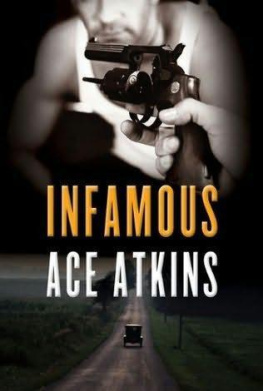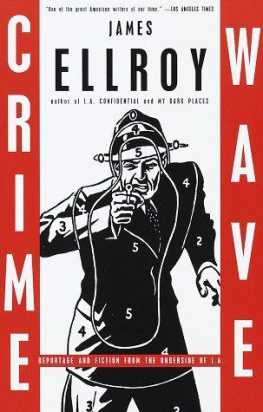Thanks to the following: Mike Hart, John Williams and Philippe Garnier for pointing me in the right direction; Pete Ayrton for unknowingly suggesting the subject of Heartbreak and Vine ; Mavis Haut for reading the book in manuscript; Emma Waghorn for her astute copy editing; A.I. Bezzerides, Edward Bunker, James Lee Burke, Michael Connelly, James Crumley, James Ellroy, Barry Gifford, James Hall, Dennis Lehane, Elmore Leonard. George Pelecanos, Gerald Petiewich, Joseph Wam baugh and Donald Westlake for kindly answering my questions: and to the many novelists-scriptwriters who, for lack of space, have gone unmentioned.
Introduction
Once I was invited to a screenwriters house in Los Angeles and I brought along, as a gift, a copy of my first novel. My hosts reaction, as he flipped through the pages, confounded me. His expression was a dumbfounded mixture of awe and pity.
Man, thats a lot of words, he said, clapping the book shut with a flourish that indicated it would probably never be reopened. With the tactlessness Ive encountered only in Hollywood, he then said, How much do they pay you for something like that?
Of course, this guileless guy belonged to the new generation of screenwritersthose whose first (and frequently only) attempts at storytelling come in bare-bones script form, the words chosen merely as placeholders for the visuals, not to actually conjure the visuals. Unlike the writers who crafted Americas cinematic legacymost of whom were journalists, playwrights, and novelistssuccessful screenwriters today by and large set out to be screenwriters, which might explain why you rarely hear anymore the kind of ruined artist horror stories that fill the pages of this book.
The screenwriter in my anecdote, of course, had earned more for a single clich-ridden horror script than Id made, in total, from writing seven books. Which explains in a nutshell the everlasting allure of Hollywood, both for writers and for those who think they are writers. In Heartbreak and Vine, Woody Haut chronicles the tempestuous and torturous way the movie business has traditionally fted and fucked over its writersin this specific case, creators of crime fiction.
Most of Hauts case studies take place during an era when moviemaking was a factory business, one that routinely ground down overly sensitive artists. Novelists and playwrights generally fared the worst, while magazine and newspaper professionals thrived; graduates of the fourth estate (Ben Hecht, Jules Furthman, Herman Mankiewicz, Gene Fowler, Art Cohn, to name a few prolific examples) were familiar with deadline pressure and ambivalent reaction; they were thrilled, even bemused, by a gig that allowed them to write less words for more money.
Creators of crime fictionand make no mistake, these were the first-generation creators of a now well-established formoccupied an intriguing niche, one that would become highly influential. Many came straight from the low-rent trenches of the pulps, adept at banging out twisted plots and vivid characters at a breakneck pace, often for as little as a penny a word. But in many casesand heres to you, Dashiell Hammett, Horace McCoy, James M. Cain, Raymond Chandler, W. R. Burnett, and David Goodisthey harbored serious literary ambitions, whether theyd admit it or not. The conflict between those ambitions and the lowest common denominator realities of the movie business drove many of these writers to drink and/or despair. Yet diligently, perhaps even unknowingly, they (and other writers they directly influenced) laid the groundwork for a new school of fiction. Call it Hard-boiled, call it Noir, call it whatever you wantits main tenet was that contemporary American life was, is, and always will bea crime story.
In focusing on the lives and careers of 29 writers emblematic of this school, Woody Haut provides an essential but often overlooked perspective on whats now routinely referred to as film noir. He gives voice to the artists who forged the foundation of the genre (if indeed we can call it genre; these days I favor the term noir ethos when describing the themes and style that unite the literature and film of this particular school). Heartbreak and Vine should be required reading for any college course on Noir because it suggests, concisely and colorfully, that the filmographies of directors such as Fritz Lang, Robert Siodmak, John Farrow, Robert Aldrich, and many others, might be far less revered if the visions of Cornell Woolrich, Jonathan Latimer, Buzz Bezzerides, and William P. McGivern, et al hadnt played a major part in forging their reputations.
Sharp and insightful portraits are offered of the usual suspects, genre stalwarts such as Hammett, Woolrich, Chandler, and Cain (both Paul and James M.), and Haut effectively reveals the parallels between the noir-stained lives of David Goodis and Jim Thompson and their nightmarish narratives. But for me the most valuable aspect of Heartbreak and Vine is the overdue credit paid to such under-appreciated authors as Latimer and Bezzerides, Leigh Brackett, Daniel Mainwaring, W. R. Burnett, and even H. N. Swansonan agent, not a writer, but a figure no less critical in crime fictions ascension in American pop culture.
Haut smartly tracks his subjects like a detective, doing diligent legwork, adhering to the facts, never romantically or cynically stretching the truth to fit some pre-ordained thesis. He leaves those embarrassing trapdoors to the specious speculations of vainglorious academics, those who believe their personal theories more significant than reality. When Hauts narrative catches up with contemporary writers such as Gerald Petievich and Michael Connelly, he wisely lets them speak for themselves. Distinctive personalities emerge, not an overarching treatise. In these passages Heartbreak and Vine charts fresh, vital terrain, as Eddie Bunker, Jim Crumley, Elmore Leonard, James Ellroy, Barry Gifford, Dennis Lehane and others discuss the evolution of the genre, what theyve learned from the travails of their forbearers, and how theyve managedin at least a few happy casesto survive pitfalls once deemed endemic to anyone writing for the show business.
Hollywood has always chosen to celebrate flash and bombast over persistence and craftsmanship, even though the former typically rides high on the shoulders of the latter. Which is one reason why directors, not writers, are the Kings of Hollywood. Youll never see a Hollywood film with the screenwriters name following the possessory credit A Film By. Thats reserved, by the industrys common law, exclusively for directors (Every ten years or so the Writers Guild takes a run at it, and the Directors Guild threatens a work stoppage to protect its cherished A Film By credit.)



